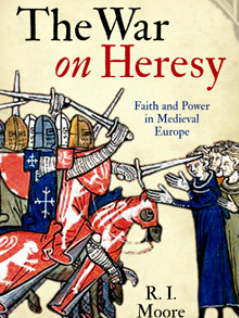I’ve been back in the UK for a couple of weeks, where the conversation was dominated by bankers, tennis and the weather. Bob Diamond and Andy Murray both failed at the final hurdle; the one a cause for celebration, the other for commiseration. Murray will get another chance. One trusts that Diamond will not.
Of course, while I was away I kept in regular touch with events in the Uzège, and ensured the continuation of cultural connections with the arrival on my Kindle app of the new book by Professor R.I. Moore. The War on Heresy: Faith and power in medieval Europe overturns much of what I had taken for granted about the dualist religions and philosophies collected under the catch-all title of Catharism, and one of the reasons why I took the received wisdom for granted was that historians such as Professor Moore had convinced me of it. He has changed his mind, and changed mine, not least by returning to primary sources and taking us back not merely to the 12th century but to 1022 and the first burnings in Western Europe in Orléans.
In fact, it appears, theological dualism, particularly in the Midi, was largely the creation of the inquisitors. The majority of Albigensians/Cathars/Manicheans et al were merely attempting a more ascetic way of life, of poverty and purity, more in keeping with their perception of the life of Christ, and with the thrust of the Gregorian reforms of the Church itself. In parallel, we also have the influence of Greek philosophy and in particular Plato, who argued that what is material is by definition transient and corruptible.
One can see how this can be characterised as a (potential) form of dualism, and how it might be developed into a dualist philosophy. As Moore points out, “neoplatonists might deny that the Holy Spirit was contained in the water of baptism, or conveyed by the hands of the priest in blessing … without necessarily denying the sacraments themselves”. But is clear that the logical conclusion of this kind of thinking is the adoption of celibacy and vegetarianism, the denial of the pleasures of the flesh, which the bons hommes espoused and which distinguished them from their Catholic cousins, who certainly eschewed poverty and to a large extent purity. (The side issue of Donatism, which argued that the efficacy of the communion was measured according to the moral rectitude of the priest, was a very specific danger indeed.)
In short, there was no sudden uprearing of heresy in the Midi in the 12th century. There was a great number of different strands of thought, all of which posed a threat – real or imagined – to the Church and the Vatican at a time when popes were looking to become monarchs and to win the battle with the eastern Churches. Dualism, an Eastern concept familiar to all students of theology, was a convenient scapegoat. The lifestyle of the so-called heretics was actually Christian, and exemplarily so. But dualism was a heresy and as such could be justifiably be used as a pretext for the Albigensian crusades.
And it is the success of that imperialist war which is the reason why I am writing this blog in France rather than L’Occitanie.
Today’s listening: Schubert’s String Quartet No 15, in G major by the New Orford Quartet, recommended to me by Peter Mendell last night. He is a friend of this excellent Canadian ensemble and also, I am proud to say, of mine.






 RSS Feed
RSS Feed